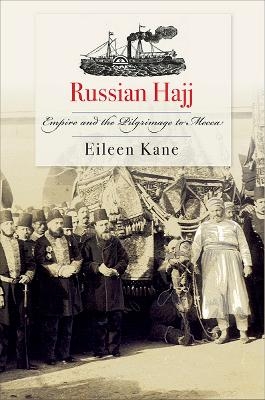
Russian Hajj
Empire and the Pilgrimage to Mecca
Seiten
2015
Cornell University Press (Verlag)
978-0-8014-5423-3 (ISBN)
Cornell University Press (Verlag)
978-0-8014-5423-3 (ISBN)
The first book in any language on the hajj under tsarist and Soviet rule, Russian Hajj tells the story of how tsarist officials struggled to control and co-opt Russia's mass hajj traffic, seeing it not only as a liability, but also an...
In the late nineteenth century, as a consequence of imperial conquest and a mobility revolution, Russia became a crossroads of the hajj, the annual Muslim pilgrimage to Mecca. The first book in any language on the hajj under tsarist and Soviet rule, Russian Hajj tells the story of how tsarist officials struggled to control and co-opt Russia's mass hajj traffic, seeing it as not only a liability but also an opportunity. To support the hajj as a matter of state surveillance and control was controversial, given the preeminent position of the Orthodox Church. But nor could the hajj be ignored, or banned, due to Russia's policy of toleration of Islam. As a cross-border, migratory phenomenon, the hajj stoked officials' fears of infectious disease, Islamic revolt, and interethnic conflict, but Eileen Kane innovatively argues that it also generated new thinking within the government about the utility of the empire's Muslims and their global networks.
Open Access edition funded by the National Endowment for the Humanities
In the late nineteenth century, as a consequence of imperial conquest and a mobility revolution, Russia became a crossroads of the hajj, the annual Muslim pilgrimage to Mecca. The first book in any language on the hajj under tsarist and Soviet rule, Russian Hajj tells the story of how tsarist officials struggled to control and co-opt Russia's mass hajj traffic, seeing it as not only a liability but also an opportunity. To support the hajj as a matter of state surveillance and control was controversial, given the preeminent position of the Orthodox Church. But nor could the hajj be ignored, or banned, due to Russia's policy of toleration of Islam. As a cross-border, migratory phenomenon, the hajj stoked officials' fears of infectious disease, Islamic revolt, and interethnic conflict, but Eileen Kane innovatively argues that it also generated new thinking within the government about the utility of the empire's Muslims and their global networks.
Open Access edition funded by the National Endowment for the Humanities
Eileen Kane is Associate Professor of History at Connecticut College.
Introduction: Russia as a Crossroads of the Global Hajj1. Imperialism through Islamic Networks2. Mapping the Hajj, Integrating Muslims3. Forging a Russian Hajj Route4. The Hajj and Religious Politics after 19055. The Hajj and Socialist RevolutionConclusion: Russian Hajj in the Twenty-First Century
| Zusatzinfo | 29 Halftones, black and white; 6 Maps |
|---|---|
| Verlagsort | Ithaca |
| Sprache | englisch |
| Maße | 152 x 229 mm |
| Gewicht | 907 g |
| Themenwelt | Geschichte ► Allgemeine Geschichte ► Neuzeit (bis 1918) |
| Geisteswissenschaften ► Geschichte ► Regional- / Ländergeschichte | |
| Geschichte ► Teilgebiete der Geschichte ► Religionsgeschichte | |
| Geisteswissenschaften ► Religion / Theologie ► Islam | |
| Sozialwissenschaften ► Soziologie | |
| ISBN-10 | 0-8014-5423-9 / 0801454239 |
| ISBN-13 | 978-0-8014-5423-3 / 9780801454233 |
| Zustand | Neuware |
| Haben Sie eine Frage zum Produkt? |
Mehr entdecken
aus dem Bereich
aus dem Bereich
Europa 1848/49 und der Kampf für eine neue Welt
Buch | Hardcover (2023)
DVA (Verlag)
CHF 67,20
Giordano Bruno - ein ketzerisches Leben
Buch | Hardcover (2024)
C.H.Beck (Verlag)
CHF 41,85


